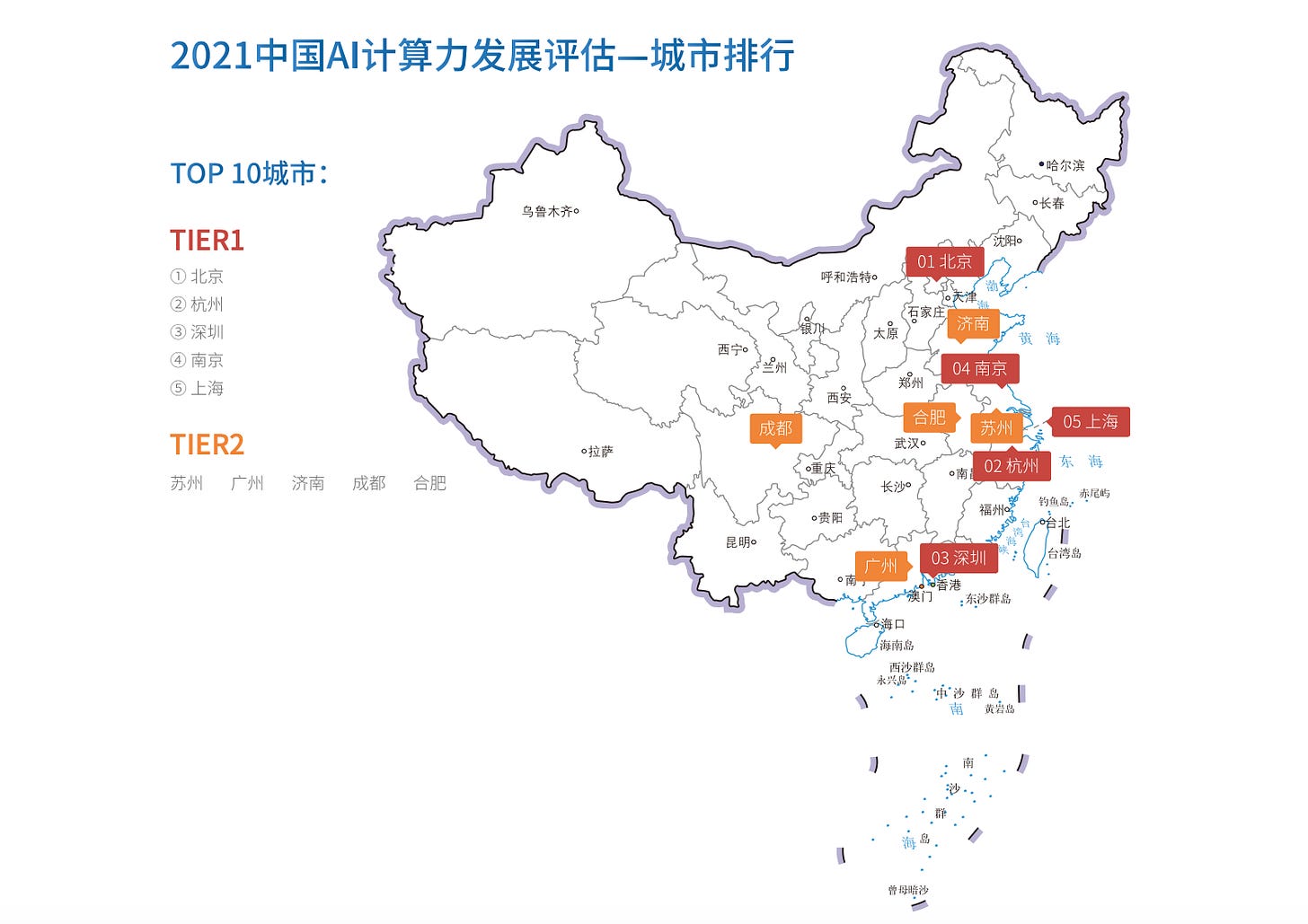Top 10 China AI Cities; Cambricon Introduces 7nm AI Chip; AI Medicare Provider Airdoc Goes Public
China’s AI news in the week of November 7, 2021
Top 10 Chinese Cities by AI Computing Development
Beijing, Hangzhou and Shenzhen unquestionably topped the annual ranking of the top 10 China AI cities, while Nanjing overtook Shanghai to the fourth place, followed by Suzhou, Guangzhou, Jinan, Chengdu, and Hefei.
The list was released this week at the 2021 Artificial Intelligence Computing Conference (AICC) hosted by the Chinese Academy of Engineering and Inspur, whose headquarter city Jinan, Shandong took the spot for the first time.
Let’s break down why these cities are selected.
Beijing: The capital city of China takes the top honors for the fifth consecutive year and is expected to continue its win streak, thanks to tech companies (Baidu and ByteDance) and top-tier schools (Tsinghua University and Peking University) as well as talent pools, commercial environment and policy support. Beijing's AI-relevant industry value reached CNY¥186 billion, a 9.8% increase year over year.
Hangzhou: The headquarter city of Alibaba and Ant has been approved to create a national AI pilot zone in 2021. The government is also zeroing in global talent attraction by rolling out the 521 Program for Global Talents Introduction and the Hangzhou "115" Overseas Talent Introduction Plan.
Shenzhen: The Silicon Valley of China, also home to Huawei and Tencent, has 1318 AI companies led by Tencent and Huawei in 2020. China's National Supercomputing Center in Shenzhen on Friday launched a testbed for artificial intelligence (AI) experiments in 2019, and would complete the development of the next-gen supercomputer by 2022.
Nanjing: The surprising elevation of Nanjing in the list can be attributed to the city’s development of East China Regional Data Center and Nanjing Intelligent Manufacturing Research.
Shanghai: Shanghai aims to reach a world-leading level in the development of artificial intelligence by 2025, according to the 14th Five-Year Plan of the city. Shanghai will advance AI to fully empower the manufacturing industry, support enterprises to develop AI products and systems, and accelerate the construction of AI pilot areas.
Suzhou: As part of the Yangtze River Delta City Cluster, Suzhou is building a smart city system powered by AI, personalized healthcare, robotics, and advanced driver systems. Suzhou Industrial Park, the second most productive industrial park in China, lays the foundation.
Guangzhou: In early 2020, Guangzhou announced a plan to launch a zone dedicated to AI and the digital economy. The city is a hub for robotaxi deployment, manufacturing automation, speech technology, and server robots.
Hefei: The home city to iFlyTek and the University of Science and Technology of China is the country’s speech technology tech center. China Speech Valley, an intelligent speech industrial cluster located in Hefei, houses 1,024 enterprises that contribute to the operating revenue of CNY¥106 billion last year.
Jinan: The capital city of Shandong Province thrives on the completion of Jinan Area of China (Shandong) Pilot Free Trade Zone, Jinan High-tech Zone, and Shandong’s New and Old Kinetic Energy Conversion Pilot Zone. Jinan has more than 4,400 AI software copyrights.
Chengdu: Chengdu has become the first AI innovation and application pilot zone in West China. Chengdu Science City holds the core of the next-gen AI industry ecosystem in Chengdu.
Chinese AI Medicare Company Airdoc Starts Trading in Hong Kong
Beijing-based AI healthcare solution company Airdoc kicked off trading on November 5, 2021, on the Hong Kong Exchange, raising HK$1.67 billion (US$214.8 million) with its IPO.
Founded in 2015, Airdoc is one of the first companies that provide AI-empowered retina-based early detection, diagnosis and health risk assessment solutions in China. Its core product Airdoc-AIFUNDUS (1.0) is a type of AI-based Software as a Medical Device (SaMD) and has been approved by the National Medical Products Administration for auxiliary diagnosis of diabetic retinopathy, a diabetes complication that affects eye health. The patient population in China was 37.3 million in 2020 and is forecasted to reach 50.6 million in 2030.
The Airdoc-AIFUNDUS 2.0 and 3.0 will assist physicians to diagnose hypertensive retinopathy, retinal vein occlusion, AMD, pathological myopia and retinal detachment, according to the company.
Other solutions and products include a series of health risk assessment solutions to provide basic health assessment and early detection of risk indicators based on retina images, and three in-house developed fundus cameras.
Airdoc’s revenue in the first half of 2021 is CNY¥49.47 million, mostly contributed by the health risk assessment solutions, with a net loss of CNY¥37.49 million. The company has raised almost CNY¥800 million before its IPO.
Cambricon unveils 7nm AI chip for cloud computing: 256TOPS, LPDDR5
Chinese AI chipmaker Cambricon recently introduced their latest neural processor for cloud servers, which immediately gave its stock price a nearly 10% boost. The new announcement includes MLU370 (思元370), two accelerator cards MLU370-S4 and MLU370-X4, and a software stack Cambricon Neuware.
The company’s 3rd-gen cloud AI chip boasts 39 billion transistors on a 7nm chiplet, doubling the performance of its predecessor MLU 270 with up to 256TOPS (INT8). Built on its home-grown chip architecture MLUarch03, the MLU370-S4 accelerator card can train ResNet-50 two times faster than GPU with the same size.
MLU370 is also the first cloud AI chip that uses LPDDR5 memory, which is 1.5 times more power-efficiency than GDDR6.
MLU370 has been taped out in the third quarter of 2020 and its accelerator cards have been shipped to the company’s clients like Alibaba and Baidu for testing starting the second quarter of 2021. TSMC should remain the fab of the new chiplet, though the company didn’t disclose such information.
The underlying processor architecture MLUarch03 features a new supercharger module to boost the chip’s efficiency in processing convolution neural networks, and a multi-operator hardware integration technology to decrease the processing time of each operator.
One MLU370 chiplet bonds two MLU-Dies, each packaging an independent AI computing unit, memory, IO, and MLU-Fabric to interconnect two dies.
Cambricon also released an associated inference engine called MagicMind, which is said to be the first commercial inference engine built on MLIR, a novel compiler infrastructure to address software fragmentation, improve compilation for heterogeneous hardware.
Cambricon reports revenue of RMB222 million yuan in the first three quarters of 2021, and a net loss of RMB629 million yuan. The company’s stock price has fallen 41.56% year to date.
Investment News:
Envision Group, a Shanghai-based greentech company, has raised over US$1 billion in strategic funding led by GIC Private Limited, Primavera Capital, and Sequoia Capital. Founded in 2007, Envision designs, sells and operates smart wind turbines, AIoT-powered batteries, and the world’s largest AIoT operating system. It is the world’s fourth-largest supplier of wind turbines in 2020, according to Fortune.
ProLogium Technology, a Taiwan-based solid-state battery (SSB) maker, has announced the completion of a US$326 million financing round participated by dGav Capital, Primavera Capital, and SBCVC. Founded 15 years ago, ProLogium is the world's first company to successfully develop, mass produce, and commercialize the solid-state lithium ceramic battery (SSB).
Angitia Biopharmaceuticals, a Guangzhou-based biotechnology company, has raised US$70 million in its Series B funding round. Established in June 2018, Angitia focuses on the discovery and development of innovative therapeutics for serious musculoskeletal diseases.






